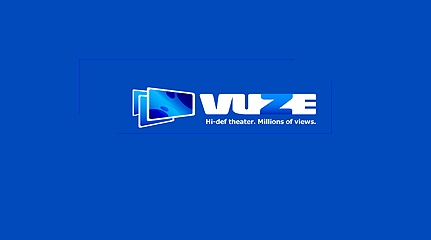VUZE: How A "Content Pirate" Is Taking On Comcast and ISPs Who "Throttle" Internet Traffic

Vuze, Inc. started out life as Azureus, named after its BitTorrent client, and in April, 2007 re-launched as an open entertainment platform leveraging its peer-to-peer (P2P) technology to efficiently distribute licensedDVD-quality (including HD) long-form content. By mid-December of 2007 Vuze closed its Series C round (led by New Enterprise Associates) adding another $20 million to a kitty totaling $34 million. Touting over 17 million installations of its software, it continues to amass A-list content partners including BBC, Showtime, A&E, and G4.
But it was a legal brief that Vuze filed with the FCC in November, asking the government body to revisit its Internet Policy Statement on broadband, and to specifically define what is "reasonable network management," that has made the company an overnight star and elevated it into a leadership role, even as it carefully balances its relationships with ISPs, content providers, and users. The 16-page document explicitly named Comcastfor traffic shaping and asked the FCC to forbid Comcast "from unreasonably discriminating against lawful Internet applications, content, and technologies." Last Friday, Comcast filed its response to the FCC. While the cable provider declined to share the substance of its brief with the media, terming its response as a confidential request for information, it released a statement that "Comcast does not, has not, and will not block any Web sites or online applications, including peer-to-peer services."
In an exclusive interview with JackMyers Media Business Report Vuze CEO Gilles BianRosa described Vuze's transition from content pirate to White Knight and shared the rationale for calling out Comcast. He also discussed how its recent investor windfall will be deployed in 2008.
SOLD OUT! Advertising Women of New York 5th Annual WHAT'S HOT IN MEDIA BUYING-2008 Wednesday, January 30th featuring Jack Myers, Robin Steinberg, Kris Magel, Chris Paul, and Steve Ridley.
Last fall cable subscriber John Hart made headlines with his lawsuit against the ISP for performance slowdowns when using "blocked applications" as defined by Sandvine, Comcast's traffic management application. Mainstream media was quick to describe the actions as "traffic throttling," while Slashdotters perceived it as something more insidious. Not only was the cable operator discriminating against lawful Internet applications, but some alleged, it was violating Federal computer fraud laws. So why enter the fray?
BianRosa observed, "In the last 18 months ISPs started to unilaterally shape traffic, deciding what you can and cannot do with an Internet connection." Vuze perceived that such arbitrary actions threatened to undermine, if not dismantle, its business model. After his staff detected clandestine attempts to degrade and block content by Comcast, Vuze recognized that its position in the marketplace made it a natural spokesman. Says BianRosa, "We touch consumers, content creators, and ISPs. We know that it's pointless to prevent users from watching videos; it's like spitting into the wind. Rather, P2P is an effective means of downloading content, one that the creators of the WWW couldn't have had in mind as the Internet was originally designed for text and images. The infrastructure needs to evolve; it's antiquated."
With telcos and cable companies likewise in the business of delivery content, perhaps this is merely a preemptive strategy to thwart the competition? BianRosa demurs, "Certainly I am not saying what their interest is, but it would be worrisome if this were the case. We want to raise the flag that there is a risk here for unfair competition. That is why we filed a petition for rule-making. The FCC published their policy statement for broadband guidelines but it's not enough, especially given what's at stake." BianRosa asserts that there must be transparency regarding an ISP's network management policy to both users and third party providers. "Once you have this transparency in place, then you can institute standards. The Internet works because of HTTP standards; it's a platform for innovation. And we can achieve more if we're not expending effort playing the cat and mouse game that's going on now."
BianRosa is quick to note that P2P (and by extension, Vuze) has been deliberately mischaracterized as a pirate platform. It's actually the most efficient means to delivery content, and saves the company millions in broadband costs, enabling it to reallocate resources and offer Hi-Def content and long-form videos.
On January 15, the FCC published Vuze's brief. The published paper will not only generate a response from Comcast, but the FCC has instituted a public comment period (reference WC Docket no. 07-52) through February 13. After that window closes, Vuze has two weeks to offer a rebuttal. It anticipates that this robust discussion will not only jumpstart a public debate on the issue, but offer a tangible way to make progress on Net Neutrality. (Certainly, the recent trial balloons sent up by AT&T to filter content for intellectual property infringement, and Time Warner Cable'sprogram to meter consumer pricing based on usage, both add gasoline to the fire.)
Vuze's recent Animecontent deal is a no-brainer given the company's demo, seemingly peripheral to this meaty discussion. But BianRosa looks beyond any categorical imperative: "Anime is completely crippled by piracy. There's a correlation between piracy and how narrowly available content is. For us, focusing on Anime was a way not only to be more relevant to our user base, but to make a point. Anime is a small scale example of how it could work in the future. Anime fans are peculiar. They want the content in original language with subtitles. We actually did the subtitling then, we own the rights. Because our user base is so used to not paying for things, this is the best way for those companies to reach them and monetize it."
With the latest investment, Vuze intends to focus on its global audience in over a hundred countries (North America accounts for approximately 30 percent of its traffic). BianRosa sees the funding as a means to "support our growth and to accelerate the user experience." He emphasizes that we're in a time of flux, that the company's tools are agnostic, allowing content providers to experiment with monetization, DRM, fingerprinting, advertising, and VoD. The addition of Mike Ramsey, co-founder and former CEO of TiVo, to the Vuze board is both an injection of intellectual capital and a confirmation that the enterprise has legs.
Asked what fine point continues to elude the industry, BianRosa is emphatic: "In order to make IPTV work you essentially need to make money on every stream. People tend to forget that. For us, the way to make money is to drastically lower the cost by delivering via a P2P network and offering a higher quality TV-type experience that is full screen, HD, and long-form, thereby attracting advertisers of a different class -- TV advertisers. We then achieve a CPM at a level that you can actually turn a dollar, every time you stream."
Gilles BianRosa can be reached at contact@jackmyers.com.


